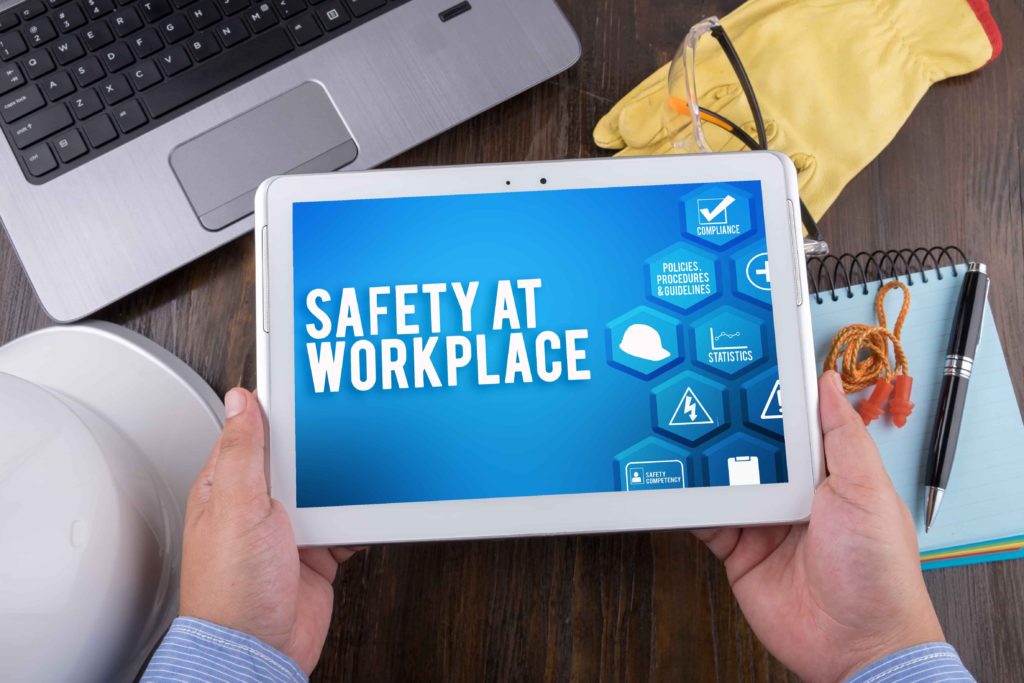
In a professional environment, office safety training can seem almost unnecessary, but is critical for maintaining health and preparedness. The same applies to more industrious workplaces, such as manufacturing plants and factories. By participating in workplace health and safety training courses, employees and managers can develop skills to recognise and manage workplace risks and hazards. In the UK, employers have a legal obligation to provide adequate safety training to their employees.
It is mandatory to make employees aware of any dangers relating to the equipment they use in the workplace environment. Employees also have a legal right to know what controls and procedures are in place to mitigate risks in the workplace, examples being safety measures for fires or any accident.
However, it can be difficult for employers to know what training at work they should be offering. In this article, we’ll outline ten examples of safety training courses vital for the workplace.
1. UKATA Asbestos Awareness Online Course
According to the Health and Safety Executive (HSE), 5000 people per year still die of asbestos related illnesses. Anyone who employs those that may be accidentally exposed to asbestos fibres must provide sufficient work safety training to protect their employees from this hazard.
The UKATA asbestos awareness online course is designed to make participants fully aware of the dangers of asbestos. Trainees completing this course learn how likely they are to encounter asbestos-containing materials (ACMs), basic safety measures needed to avoid exposure to ACMs, and what steps to take should if a person is exposed. Key aspects of asbestos legislation and risk assessment procedures are also covered.
This online course consists of five modules which can be taken in stages or completed in one sitting. The duration of the course is approximately four hours.
2. IOSH Managing Safely Online
To ensure a safe working environment, managers need to be aware of any potential health and safety risks. The Institution of Occupational Safety and Health (IOSH) is the leading global health and safety membership body, which provides managers with a tool to do just that.
The IOSH Managing Safely ® Online course provides participants with the skills to recognise, assess and mitigate workplace risks and hazards. Trainees taking part in this course learn how to integrate basic health and safety practices into management strategies and how to ensure employees receive sufficient safety training and supervision.
The course consists of seven theory modules, an end of course test, and a practical test. The estimated course duration is approximately 24 hours in total. Modules can be taken as a whole or split individually. Each delegate has six months to complete the course.
Upon completion of the course and the tests, participants will be awarded an IOSH Managing Safely ® Certificate.
3. Anti-Bribery & Corruption
Under the UK Bribery Act 2010, any commercial enterprise based in the UK must be aware of how to recognise bribery and corruption and put in place procedures to prevent such actions. Anti-bribery and corruption training helps develop a culture of integrity within an organisation and educates employees of the consequences of involvement in bribery.
Anti-Bribery and Corruption courses ensure that an organisation complies with all anti-bribery and anti-corruption laws. By having employees participate in this course, a business will meet their legal obligations and avoid penalties.
The course covers the definitions of bribery, the six principles of the bribery prevention, and how to recognise signs of wrongdoing.
4. Behavioural Based Safety (BBS) Training for Managers
Many workplace accidents are caused by unsafe behaviour. Managers in industrial workplaces have a duty to identify and reduce the causes of unsafe behaviour. Behavioural Based Safety (BBS) training provides managers with the skills they need to create a safer working environment.
The Behavioural Safety Training in Industry for Managers is an online BBS course aimed at educating managers on techniques they can use to recognise and minimise unsafe behaviour. Participants who successfully complete this course will be awarded an internationally recognised CPD certified certificate.
5. First Aid Training
According to UK law, employers must assess any workplace risks and provide employees with appropriate first aid training. Undertaking first aid training will ensure that a business meets these obligations. This kind of safety training will give workers skills they can use to provide emergency assistance if an incident occurs.
The Workplace First Aid Online Training Course complies with HSE guidance on basic first aid in the workplace. Its aim is to enable workers to manage the time between an incident occurring and the arrival of a qualified first aider.
This online safety training course covers how an individual can provide basic first aid without endangering themselves. Participants will learn resuscitation techniques and how to assist with heart attacks, electrical shock, burns, eye injuries, broken bones, and other common injuries.
The Workplace First Aid Online Training Course can be taken in full online.
6. Mental Health First Aid
Health and safety concerns are not limited to physical hazards. Employers also have the responsibility to ensure the good mental health of their employees.
It has been estimated that one in four people in the UK experience mental health problems every year. A qualified mental health aider can provide co-workers with assistance when they are in need.
Level 2 Mental Health First Aid training gives workers the skills to recognise mental health crises and instills a deeper understanding of mental health. Not all safety training pertains to physical hazards, as mental wellbeing is part of workplace safety.
The ProQual Level 2 Award – Mental Health First Aid Awareness consists of six modules, each with a small test at the end. Participants must also pass a practical assessment test.
This course can be completed over one day, or over many smaller sessions whenever is convenient. Successful completion of the course will result in a Level 2 Mental Health First Aid certificate awarded by ProQual.
7. Manual Handling Training
Manual handling injuries are some of the most common workplace injuries in the UK. Lifting heavy objects incorrectly can result in back injuries, strains, sprains, and even broken bones. By learning how to move heavy loads correctly, office workers or those in any industry can prevent a range of common workplace injuries.
RoSPA assured manual handling training courses teach participants safe manual handling techniques. Trainees taking part in this course learn eight basic principles used to identify, assess, and reduce risks, and ways to implement these principles in daily work duties.
The course is available fully online and includes interactive quizzes so learners can review their knowledge. Trainees who complete the course and pass the associated tests will receive a RoSPA assured manual handling training certificate.
8. Slips, Trips, & Falls
Slips, trips and falls accounted for the majority of all non-fatal workplace accidents reported in the UK in 2019/20, according to recent data obtained by the HSE. Likewise, falls were the main type of fatal UK workplace accident during the same time period.
It is essential that employers provide safety training to help prevent common slip, trip, and fall incidents. The Slips Trips and Falls Hazards in The Workplace training offered by Human Focus provides trainees with an enhanced awareness of why these incidents occur and what can be done about them.
Successful completion of this short online course results in the award of a RoSPA assured certificate. Certificates are valid for three years. The Slips, Trips, and Falls in The Workplace course is designed for managers, supervisors, and employees alike.
9. Environmental Training for Employees
The UK government recognises that employers must make environmental protection a priority. Under the Environmental Protection Act 1990 and other relevant legislation, all businesses must take steps to minimise their waste, pollution, and impact on the environment.
To maintain environmentally friendly business practices, employers must ensure that they stay up to date with all developments. Failure to comply with environmental regulations can result in heavy penalties and severely damage an organisation’s reputation. Environmental protection training gives both employers and employees a fuller awareness and a deeper understanding of their responsibilities.
The Environmental Training course educates participants on the nature of environmental problems, current relevant government policies, and the role of business in implementing these policies. Providing this type of training ensures that your business is doing its part to minimise any damage it causes to the environment and staying within the law.
Trainees who complete the course will earn RoSPA assured certification.
10. Display Screen Equipment Training
Due to the digitisation of the workplace, health and safety issues concerning display screen equipment (DSE) usage are on the rise. DSE includes desktop computers, handheld devices, laptops, touch screens, and other equipment of this nature.
Regular use of this equipment can cause eye strain, headaches, back pain, and musculoskeletal problems such as repetitive strain injuries (RSI) or carpal tunnel syndrome. Mental health issues such as fatigue and stress also arise from the incorrect use of DSE.
As laid out in the Health and Safety (Display Screen Equipment) Regulations 1992, employers are legally obliged to manage DSE related health and safety risks. The display screen online training courses provided by Human Focus are fully compliant with all DSE regulations. These courses are approved and certified by RoSPA.
Why Safety Training Is Essential
Workplace health and safety training have many benefits for businesses. Employers that meet their health and safety obligations decrease the risk of being found negligent if an incident occurs. By reducing accident-related absences, employee productivity and morale can significantly improve.
Overall, businesses with strong health and safety cultures have safer, more positive working environments. You can find a comprehensive range of online health and safety courses at the Human Focus website.


























































































































































































































































































































































































































































































































































































































































































































































